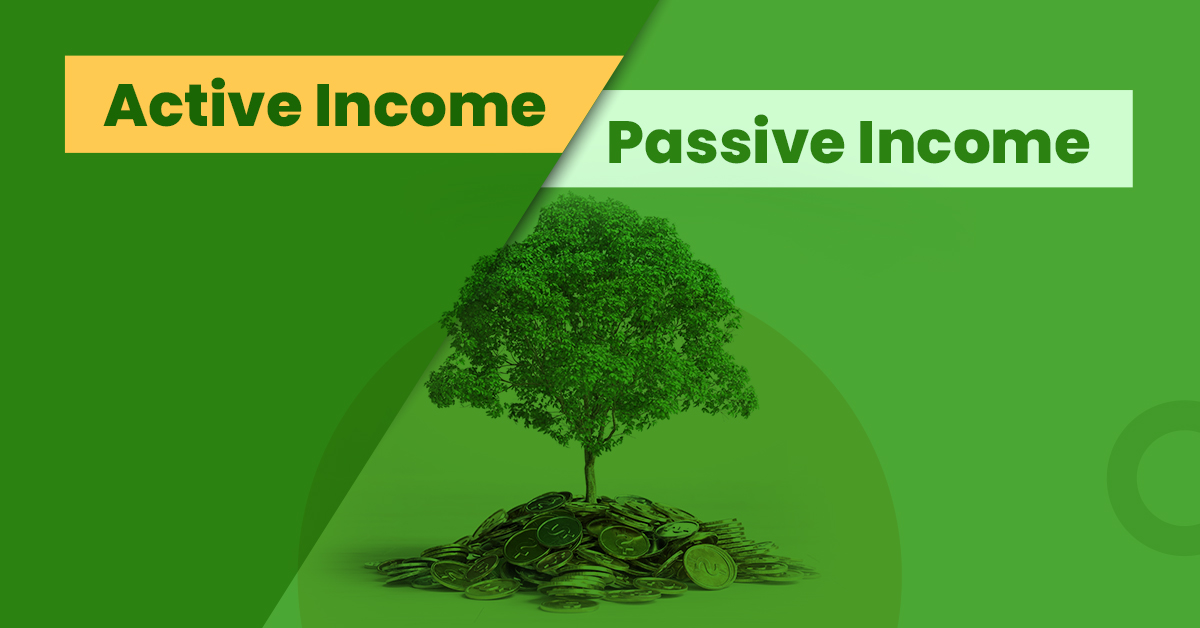Active Income vs. Passive Income: Which is the Better Option?


Your financial health is more than just the size of your salary. You could have a high-paying job or business, but still face situations like your employer shutting down the business, acute health problems, or loss of your job. Therefore, knowing about the different types of income and the benefits of each is an important chapter in your financial education.
Gross income is the sum of the earnings you obtain as your monthly paycheck, the return on various investment tools such as stocks and bonds, and other receipts. These are earned by either trading your time and labour for a price or utilising the money to generate more.
Earning both ways requires a more profound understanding of their benefits and limitations. Your income may be categorised as active or passive, depending on how you make it. Continue reading to learn about active income vs. passive income in detail, its pros and cons, and the benefits of passive income.
Also Read: Best Investment Options in India in 2022
What is Passive Income?
The income you make without direct involvement is called “passive income.” For instance, there are many different sources of passive income, including the rent you receive from renting out an extra property, stock dividends, and bond interest.
The other means through which you can generate passive income include:
- Renting out a property
- Capital gains on selling real estate
- Capital gains on selling financial securities such as stocks, bonds, etc.
- Dividends received on equity held by you
- Interest earned on various bonds and bank deposits
- Royalties on any books or content you might have created
- Being a silent partner in a business firm
- Ad revenue on a website or a YouTube channel that you might have
Advantages of Passive Income
The benefits of passive income are as follows:
- Extra source of income: Passive income supplements your earnings without your active participation. It enables you to have some extra money which can be used to generate more passive income or meet additional needs.
- Need to beat inflation: Due to inflation, the money you make today continues to lose value over time. Passive income ensures that your savings grow commensurate, if not more, to maintain their purchasing power.
- Financial security: In difficult situations, such as the loss of a job or a downturn in your business, having a passive income source can help you tide through.
- More productive work or your passion: If your passive income makes you feel secure, you can opt for professions/activities that you are passionate about, such as freelancing, working on a new venture, etc.
Disadvantages of Passive Income
The limitations of passive income are as follows:
- No control on returns: You might not be able to control the returns on your passive income sources. For example, the stocks you have bought could fall in value, and the dividends aren’t guaranteed. Moreover, real estate sometimes has slow liquidity, so relying solely on passive income could be risky.
- High initial investment: Creating a source of passive income requires a lot of investment to be sufficient for sustenance. For example, buying a property that can pay you enough rent is expensive. Similarly, the creation of online content or writing books will require a lot of time and effort.
What is Active Income?
The income that you earn by investing your time and labour for it is called your “active income.” For example, when you have a job, you agree to work for a fixed number of hours every week in return for a salary. Other examples of active income are:
- Commissions earned on sales
- Tips earned through providing quality service
- The freelance and consulting fees that you earn by being an expert in specific fields
- Arbitrage-related activities such as securities, commodities, and other forms of trading
Also Read: Muhurat Trading: Meaning, Components & Benefits
Advantages of Active Income
The advantages of having an active income are as follows:
- Predictable: Depending on your own productivity and skill level, you can predict your active income well in advance.
- Controllable: You can work overtime to earn an extra bit. Your active income is relatively less dependent on market forces.
- Need active income to generate passive income: You can save your active income and invest in passive sources as generating passive income is expensive.
Disadvantages of Active Income
There are some limitations to your active income:
- Your active income is dependent on your ability to work to get paid. In the event of prolonged health issues or family-related exigencies, you could lose your active income sources.
- Sometimes, just to make ends meet, you end up working in jobs that you don’t like and are less productive than you might otherwise be doing.
- Sometimes the income from active sources is just not enough to make ends meet.
Passive Income vs. Active Income: A Table of Comparison
| Parameters | Active Income | Passive Income |
| Efforts | Continuous material participation in performing a service or a business. | No / less material participation |
| Financial freedom | There is no financial freedom and your income depends on the effort you put in. | With enough passive income, you don’t need to work for money regularly. |
| Sources | Salaries, wages, tips, commissions, etc. | Renting out properties, returns on securities, royalties, etc. |
| Risk | There is limited risk. | Here you risk your capital to earn an income. |
| Predictable | The income is predictable. | Not very predictable and depends on market forces. |
| Limits to earning potential | Your active income is limited by the skill and effort you put in to earn it. | There is no limit to your passive income, and you can continuously acquire assets to earn more passive income. |
| Cost | The cost of increasing your active income is the cost of your education/knowledge. | Passive income sources such as real estate and sufficient financial securities are expensive. |
Best Ways to Earn Passive Income
The various types of passive income are discussed as follows:
Investment in bonds
You can buy corporate and government bonds after checking their credit rating and the risks involved. These usually come with attractive interest payments at periodic intervals. You can ladder your investments into multiple bonds of different maturities to meet your liquidity needs.
Freelancing
You can provide freelance services to crowdsourcing websites. You can publish your art, etc., and earn from anyone buying or borrowing rights for the same.
Real estate
You can buy real estate and earn an income from leasing or renting it. You can also register it on various websites to provide value-added stay facilities.
Dividend stocks
You can continually use part of your active income to invest in dividend-paying stocks. These stocks pay out regular dividends, which can be a consistent stream of income.
Is Passive Income a Better Choice than Active Income?
Both active and passive income have their own pros and cons. A mix of both, ideally, is the best combination for an investor. For example, having a high active income enables you to invest in sources of high passive income. Moreover, having a good passive income ensures that you can work in jobs that are relatively lower paying but give you more satisfaction.
Thus, no active or passive income is better than the other. Your aim should be to achieve financial independence by creating sufficient passive income and aligning your active income with your passion. When you work in the field of your choice, the active income also multiplies faster.
Takeaways
After learning about active and passive incomes in detail, you would have realised that the two are interconnected. Financial freedom can be attained by creating an adequate mix of the two. Supplementing your active income with a passive one will take off the burden of making ends meet, and you can choose work that you love to do.
FAQs
What are the examples of passive income?
Examples of passive income include returns from financial instruments like bonds, stocks, and fixed deposits. It could be rental income from leasing out real estate or ad space on your website, channels, or blogs. It also includes an income stream from royalties on the use of content like art, books, graphic content, online courses, etc.
What are the examples of active income?
Examples of active income include income from salary, freelancing, commissions, etc. It also includes the returns you earn from actively investing in your own business.
What are the three major types of income?
The three main types of income include active, passive, and portfolio income. Active income is the income you obtain from exchanging your expertise, time, and effort for money. Passive income is the income generated from your assets. Portfolio income is the income generated by the management of your financial portfolios, such as buying and selling of financial securities, commodities and real estate.
How can active income be improved?
Active income can be improved by working in a field of your choice. It becomes easier to work for a longer time, and you can be more efficient in what you are good at. Also, you can improve your active income by upgrading your education and skill set.




